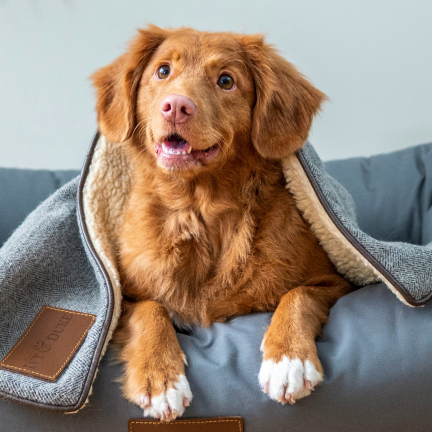Blog:8 Signs Your Dog is Overheated

As devoted dog owners, we have a responsibility to ensure our canine companions' well-being, especially during the hotter months. Overheating, also known as hyperthermia, is a serious condition that can have devastating consequences if not addressed promptly.
Common Causes of Overheating in Dogs
Overheating in dogs can be triggered by a variety of factors, both environmental and physiological. Some of the most common causes include:
- Prolonged exposure to high temperatures: Dogs are particularly vulnerable to heat-related illnesses, as they lack the ability to sweat effectively like humans. Leaving a dog in a hot, poorly ventilated environment, such as a parked car or an outdoor area without shade, can quickly lead to overheating.
- Strenuous exercise or activity: Engaging in intense physical activity, especially during the hottest parts of the day, can cause a dog's body temperature to rise rapidly, leading to overheating.
- Certain medical conditions: Underlying health issues, such as heart or respiratory problems, can make it more difficult for a dog to regulate their body temperature effectively, increasing the risk of overheating.
- Breed-specific factors: Some dog breeds, such as brachycephalic (flat-faced) breeds like pugs and bulldogs, are more prone to overheating due to their unique respiratory and anatomical features.
- Lack of access to water and shade: Dehydration and a lack of adequate shade or cooling options can exacerbate the effects of high temperatures and contribute to overheating.
Understanding these common causes can help us recognize the early warning signs of overheating and take proactive measures to protect our canine companions.
Eight Signs that Indicate Your Dog May be Overheated
Recognizing the signs of overheating in dogs is crucial, as it can help us intervene quickly and prevent serious health consequences. Here are eight key indicators that your dog may be experiencing heat-related distress:
1. Excessive panting: Panting is a dog's primary mechanism for regulating their body temperature, but excessive, rapid, or labored panting can be a clear sign of overheating.
2. Rapid breathing: In addition to panting, dogs experiencing overheating may exhibit rapid, shallow breathing patterns.
3. Lethargy or weakness: Overheated dogs may appear lethargic, unresponsive, or have difficulty standing or walking.
4. Increased heart rate: As a dog's body temperature rises, their heart rate may increase significantly.
5. Bright red or pale gums: Checking your dog's gum color can provide clues about their circulatory and hydration status. Bright red or pale gums may indicate overheating.
6. Excessive drooling or salivation: Overheated dogs may produce excessive amounts of saliva or drool as their bodies try to cool down.
7. Vomiting or diarrhea: Gastrointestinal distress, such as vomiting or diarrhea, can be a sign of severe overheating.
8. Seizures or collapse: In extreme cases, overheating can lead to neurological symptoms like seizures or complete collapse.
If you observe any of these signs in your dog, it's crucial to take immediate action to cool them down and seek veterinary care if necessary.
Immediate Actions to Take if Your Dog is Overheated
If you suspect your dog is experiencing overheating, time is of the essence. Here are the steps you should take to cool them down and provide immediate relief:
- Move your dog to a cool, shaded area: Quickly relocate your dog to a cool, well-ventilated space, such as an air-conditioned room or a shaded outdoor area.
- Apply cool water: Gently sponge or spray your dog's body, especially their head, neck, and paws, with cool (not cold) water to help lower their body temperature.
- Provide access to water: Offer your dog small amounts of cool, fresh water to drink, but avoid forcing them to drink if they are not interested.
- Use fans or air conditioning: If available, use fans or air conditioning to help circulate the cool air and further lower your dog's body temperature.
- Monitor their condition: Continuously observe your dog's breathing, heart rate, and overall demeanor, and be prepared to seek immediate veterinary care if their condition does not improve or worsens.
- Avoid over-cooling: While it's important to cool your dog down, avoid using ice packs or excessively cold water, as this can lead to shivering and further stress.
- Consult your veterinarian: Discuss your dog's specific needs and risk factors with your veterinarian, who can provide personalized recommendations for keeping your furry friend safe and healthy during hot weather.
Prompt action and vigilance are crucial in addressing overheating in dogs. If your dog's condition does not improve or if you have any concerns, do not hesitate to contact your veterinarian for further guidance and treatment.
Contact Harmony Veterinary Care Today
Overheating in dogs is a serious and potentially life-threatening condition that requires prompt recognition and action. By understanding the common causes, familiarizing ourselves with the eight key signs of overheating, and taking immediate steps to cool down an affected dog, we can help safeguard our canine companions' well-being. Additionally, implementing proactive prevention strategies, such as limiting outdoor activity during hot weather, providing ample shade and hydration, and consulting with our veterinarians, can go a long way in keeping our furry friends safe and comfortable all year round.
If you're concerned about your dog's risk of overheating, consider scheduling a consultation with our veterinarian to discuss personalized strategies for keeping your furry friend safe and healthy. Visit Harmony Veterinary Care at our office in Prescott, Arizona, or call (928) 445-7499 today.



